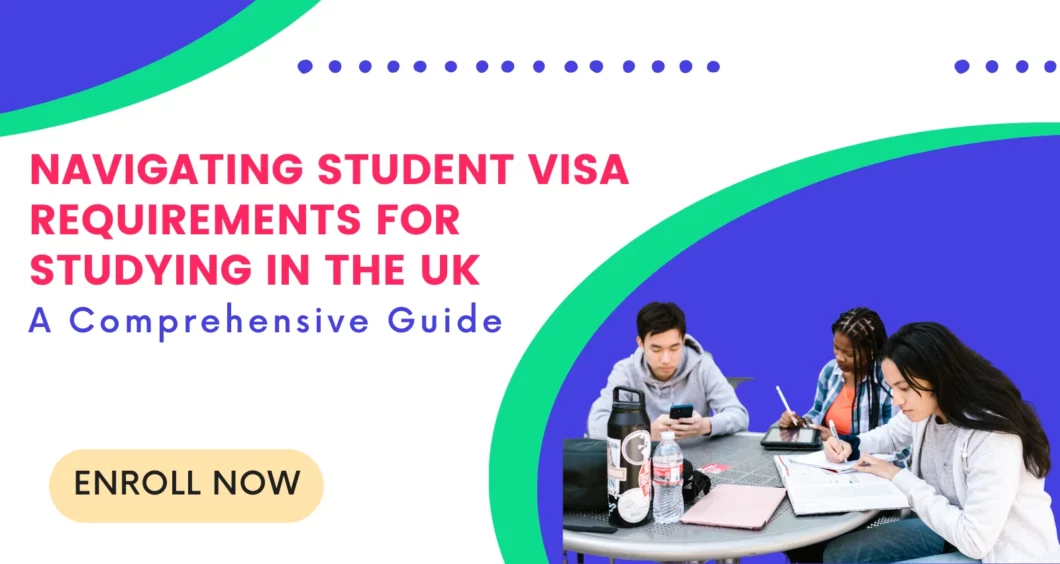No courses in the cart.
Navigating Student Visa Requirements for Studying in the UK: A Comprehensive Guide

Navigating Student Visa Requirements for Studying in the UK:
A Comprehensive Guide
Understanding the UK Student Visa System
The UK visa system can be intricate and may seem daunting for international students. But with the right information and preparation, it can be navigated successfully. This guide aims to help prospective students understand the system and its requirements.
Types of Student Visas
The UK offers two primary types of student visas: the Child Student visa (for children between 4 and 17 who wish to study at an independent school) and the Student Visa, formerly known as Tier 4 (General) student visa (for students aged 16 and over). It is important to understand which visa is suitable for your course and age.


General Requirements for a UK Student Visa
Generally, to be eligible for a UK Student visa, you must be 16 or over, have been offered a place on a course by a licensed student sponsor, have enough money to support yourself and pay for your course, and can speak, read, write and understand English.
Financial Requirements
Adequate finances are an important part of the visa application process. You need to demonstrate that you can afford the course fees and support yourself throughout your stay in the UK. The exact amount varies based on your course, its location, and its duration.
English Language Proficiency
To study in the UK, you’ll need to prove your proficiency in English. This is typically done through a secure English language test (SELT) approved by UK Visas and Immigration (UKVI).
Course Confirmation
Your chosen institution must provide a confirmation of acceptance for studies (CAS) for you to apply for a Student Visa. The CAS is a virtual document with a unique reference number that includes information about your course and your personal details.
Application Process
Once you have your CAS and meet the other requirements, you can apply for your visa. The process involves completing an online application, paying the visa fee, and attending an appointment at a visa application centre to provide your biometric information (fingerprints and a photograph).
Post-Study Work Options
After finishing your studies, you may want to stay in the UK to work. The new Graduate Route visa, launched in July 2021, allows eligible students to stay in the UK to work or look for work for up to 2 years (3 years for PhD students) after completing their studies.
Common Mistakes to Avoid
Avoid common pitfalls such as leaving your application until the last minute, not providing the right documents, and not preparing adequately for your credibility interview. It’s important to read the visa guidance in full to ensure you meet all the requirements.
Frequently Asked Questions
How much does it cost to apply for a UK Student Visa?
As of 2023, the application fee for a Student Visa is £348 if you apply from outside the UK. You also need to pay the healthcare surcharge as part of your application, which is typically £470 per year.
How long does it take to get a Student Visa in the UK?
The earliest you can apply for a visa is 6 months before your course starts. Once you apply, you should get a decision within 3 weeks.
Can I work while studying in the UK?
Yes, students with a Student Visa can work in most jobs, with some restrictions. You can work up to 20 hours a week during term time and full-time during holidays.
Can I bring my family with me?
In certain circumstances, you may be able to bring dependents (your partner and your children under 18) with you while you study in the UK.
Can I extend my Student Visa?
Yes, you can apply to extend your Student Visa from within the UK if you’re continuing your studies or moving to a new course.
How long can I stay in the UK after my studies end?
If you’re eligible for the Graduate Route visa, you can stay in the UK to work or look for work for up to 2 years (3 years for PhD students) after you complete your course.
What happens if my visa application is refused?
If your visa application is refused, you can apply for an administrative review of the decision. In some cases, you may be able to reapply.
Can I switch to a Student Visa from another visa type while in the UK?
Yes, it is possible to switch to a Student Visa from some other types of visas while you’re in the UK.
Do I need to register with the police after arriving in the UK?
Some international students need to register with the police after they arrive in the UK. This will be stated on your visa decision letter if it applies to you.
What is a credibility interview?
As part of your Student Visa application, you may need to attend a credibility interview. This is a chance for the Home Office to confirm that you’re a genuine student.
What documents do I need for a UK Student Visa application?
You’ll need documents to prove your identity and status, including your passport, proof of finances, confirmation of acceptance for studies (CAS) from your course provider, and proof of English language proficiency.
Do I need to have a certain level of English to study in the UK?
Yes, you must prove your English language abilities to a certain level to be eligible for a Student Visa. The level you need depends on the course you plan to study.
What does 'sponsor' mean in the context of a UK Student Visa?
In this context, a sponsor is your education provider. They must be licensed by the UK government to sponsor international students.
What's the difference between a Student Visa and a Child Student Visa?
A Student Visa is for students aged 16 and over, while a Child Student Visa is for children aged between 4 and 17 who want to study at an independent school in the UK.
What's the difference between a Student Visa and a Short-term Study Visa?
A Short-term Study Visa is for students doing short courses of study in the UK. You can’t work or bring dependents with you on this visa, and you can’t extend it.
Can I study part-time with a Student Visa?
Yes, but there are restrictions. You can’t work during your studies, and you’re not eligible for the Graduate Route.
Can I change my course or institution once I'm in the UK?
Yes, but you may need to apply for a new Student Visa if your new course or institution isn’t on your current visa.
Do I need to have a certain amount of money to apply for a Student Visa?
Yes, you must have enough money to support yourself and pay for your course. This amount varies depending on your circumstances.
Can I apply for a Student Visa if I have a criminal record?
Having a criminal record doesn’t automatically disqualify you from getting a visa, but the Home Office will consider the nature and relevance of the crime.
How can I find out more about UK Student Visas?
You can find more detailed information on the UK government’s website.
Conclusion
Securing a student visa for the UK involves a thorough understanding of the requirements and careful planning. The process, though seemingly complex, is manageable and ultimately rewarding, opening the door to world-class educational experiences in the UK. Whether you're aspiring to delve into the rich academic traditions of Oxford or Cambridge or the cutting-edge research environments of the University of Manchester or Imperial College London, a UK student visa is your key to these opportunities.
Keep in mind, your educational journey doesn't just hinge on getting the visa but also successfully transitioning into UK student life. Be sure to explore accommodation options, understand the cultural nuances, and, of course, focus on your studies. While the process may seem daunting at first, there are countless resources available to help guide you.
The UK offers a vibrant multicultural environment with an excellent standard of living, a wide range of extracurricular activities, and opportunities to explore iconic historic sites and landmarks. Studying in the UK not only offers academic growth but also a broader perspective on life, culture, and global issues.
With careful preparation and a proactive approach, you'll be well on your way to a fulfilling study experience in the UK. Remember, the journey of a thousand miles begins with a single step. In this case, that step is understanding and securing your UK student visa. Good luck with your future academic endeavors in the UK!











